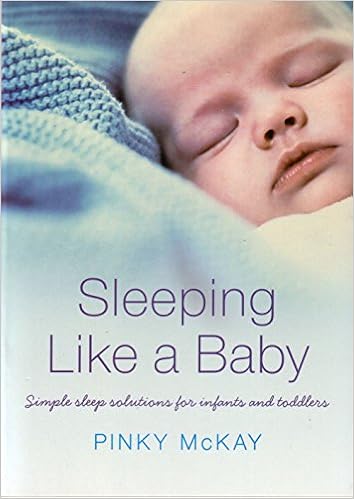
This post is a new feature for Green Mama Life and Our Baby Class of Piedmont Virginia: book reviews! I've been reading a lot of parenting books lately, and thought I should share my experiences with what I've been reading.
Today, I'm going to review Sleeping Like a Baby: Simple Sleep Solutions for Infants and Toddlers by Pinky McKay. McKay is an internationally board certified lactation consultant (IBCLC) and the author of several books. She has also appeared on many talk shows.
First off, confession time. The majority of the parenting books I've read lately have been sleep books. The Gentle Sleep Book is on my nightstand right now, and next up on the reading list. I've read Elizabeth Pantley's No Cry Sleep Solution, and some others that endorse some strategies that I am not comfortable with, but had nuggets of useful information: The Happy Sleeper by Heather Turgeon; the infamous Solve Your Child's Sleep Problems by Richard Ferber, and The Sleep Lady's Good Night Sleep Tight: Gentle Proven Solutions to Help Your Child Sleep Well and Wake Up Happy by Kim West. (More on these books in a later post about parenting books, babies, and bath water). I've been reading all of these books because my son, DC, does not sleep very well. I've posted in endless Facebook groups and feel like I've tried just about everything. (So know that when I'm teaching the class on infant sleep and coping with sleep deprivation, I've been there done that!)
What have I learned from all this reading?
1) Most sleep books are geared towards supporting parents of babies that wake frequently throughout the night.
2) Much of the advice is about how to transition a baby from soothing methods that are heavy on parental involvement to more independent soothing.
3) Very few books have information about our specific problems: a baby that often won't be soothed if he knows that it's bedtime and a baby that enjoys one long extended waking compared to frequent but short wakings.
4) There's not a lot of information out there to help parents cope when their baby won't respond to the methods listed in these other books.
Now, back to the book at hand.
First off, this book is not going to solve all your sleep problems (necessarily). But, many other things kept me bookmarking and highlighting. (33 notes and marks in my Kindle app).
The very first thing I highlighted summed up my problem with sleep books in one sentence: "If these magazine surveys are any indicator of sleep success, the regimes currently being offered are not helping babies and their parents get more sleep."
This book did not offer a regime of any kind. There are definitely suggestions for improving sleep, but without promises and guarantees. Some, I knew (such as creating a womb-like environment to help newborns transition during the fourth trimester) and some tips I hadn't heard before (DHA deficiency can affect both baby's sleep and mother's mood). The lack of regime is exactly what I appreciated: McKay is adamant that there is no one size fits all solution to get babies and toddlers to sleep. Some babies thrive on the "sleep begets sleep" philosophy, and other babies need to get tired to fall asleep. Some babies crave sensory stimulation and others are easily overstimulated. This book offers multiple perspectives, with the idea that parents are the ones that truly know their babies and can figure out what applies to their own child.
In that vein, this book had a feature that I don't usually enjoy: anecdotal paragraphs from parents. In many books, these asides turn into a "I tried this method and it worked!" advertisements for the very book they are published in. In this case, the perspectives shared by McKay support the idea that all children are different. Different families tried different methods, and found success down different avenues.
I also found that Sleeping Like a Baby aligned well with OBC's Guiding Principles. McKay writes: "One of the biggest issues around infant sleep is creating 'bad habits.'...Sleeping Like a Baby addresses these issues and shows you how to change any 'habit' at any stage gradually, with love, not tears, and how to gently introduce new sleep arrangements as your baby grows." (Principle #5 is "There are no magical times when you must start or stop something and Principle #6 is No habit you create now is irreversible).
This book addresses the science of infant sleep, the relationship between breastfeeding and sleep, safe bed sharing, SIDS risks factors and prevention methods, and how to cope. Despite being written by an IBCLC and promoting breastfeeding's benefits, this book also talks about bonding and soothing for bottle-fed babies, including anecdotes from families that use bottles as well as from mothers that breastfeed. In addition, the tips to promote a positive sleep environment are well fleshed out and explained clearly. Although some are repeated in other books I have read, I felt that this book explained them the best. They also would not be redundant if you have not read as many sleep books as I have.
In the end, if you are looking for a "sleep solution" book, this is not it. You won't walk away with a regime spelled out for you. But this is a book is for you if you need some new strategies in your bag of sleep tricks, want to understand how infant sleep works, and crave tips for surviving sleepless nights.
Note: This post contains affiliate links. Purchasing through affiliate links allows me to expand class offerings, purchase materials for my classes, and funds my continuing education as a parenting mentor.

No comments:
Post a Comment